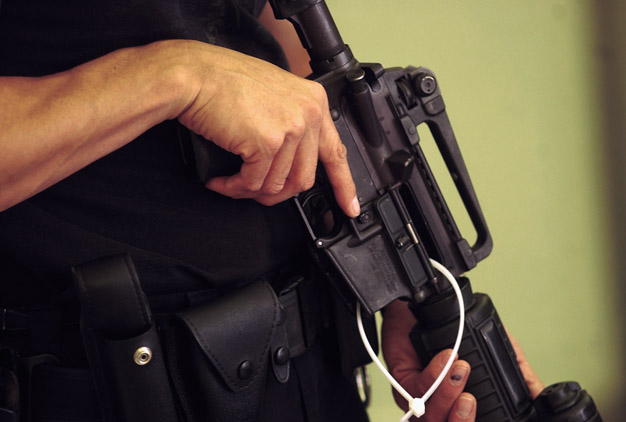America’s left-wing and right-wing activists usually disagree on everything, but their views seem to be coalescing on one subject – the pressing need to demilitarize the police. Hopefully, this agreement will extend to disarming government civilian employees who are not, or should not be, in the armed law enforcement or security business.
The military and police use different rules of engagement and levels of force because they face different threats and missions. Mixing the two is guaranteed to cause confusion and problems for all. Equipping the police with heavy weapons is a mistake; unfortunately sniper and assault rifles are necessary, but an ordinary police force or even a SWAT Team has no need for machine guns. Those are area fire-suppression weapons, totally unsuited for even intense police operations that require more accuracy and target discrimination, not less.
If you have firepower you are going to be under psychological and political pressure to take it out when any threat appears, and if you do, it’s easier to end up using it. It’s also more than a little strange to have the government argue that ordinary citizens do not need firearms for protection while at the same time using any incident or threat as an excuse to arm another segment of public employees who are not in policing or security. We would be much better off if the government and public adhered to that old adage; if you have a problem that needs a cop, then call a cop.
PEER (Public Employees for Environmental Responsibility), an advocacy group, published an article saying 2012 saw a major increase in violence directed at refuge mangers and the park police. However, when you look at the data behind the headlines you see the same story facing society as a whole: “Drugs and alcohol appeared to play a role in a large number of incidents…”
PEER shared no data concerning how many incidents may have involved poor judgment or confrontational attitudes by the public employees. The U.S. Forest Service reported more than twice the number of incidents than the other five agencies combined, but they have been lobbying for arms for years and one way to lobby is to document a lot of incidents, even small ones. As reported by the Portland (Maine) Press Herald, a study found “only three rangers [in the state] have been injured by another person in the last 20 years. Only on one occasion has a ranger deployed his pepper spray, on a dog in 2008.”
Militarizing the police and arming every land manager, forest ranger, and enforcer of fishing regulations does not make the public feel secure; it inevitably results in the feeling that we are living in a police state and many respond by arming themselves resulting in unnecessary armed versus armed confrontations. It takes a lot of special training to defuse confrontations while still enforcing the law. The money spent on arming non-police and non-security civilian employees would be better spent in teaching the art form of avoiding escalation and showdowns to those same employees.
The benefits and risks of firearms are difficult to measure. Even PEER had to admit, “The figures do not show any clear pattern reflecting liberalized loaded firearm rules in national parks and refuges which went into effect in 2010.”
American essayist and novelist Charles Dudley Warner (1829 – 1900) is credited with writing, “Politics make strange bedfellows” and so it does. Perhaps just this once the activists on both sides have the same good ideas.










